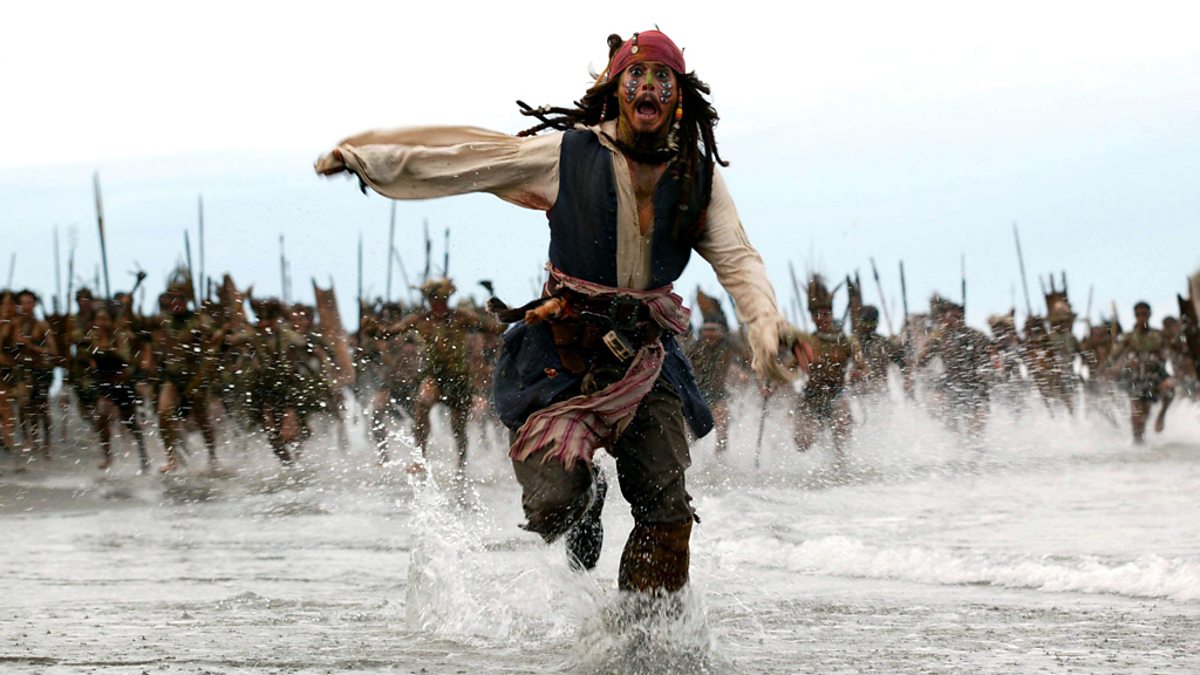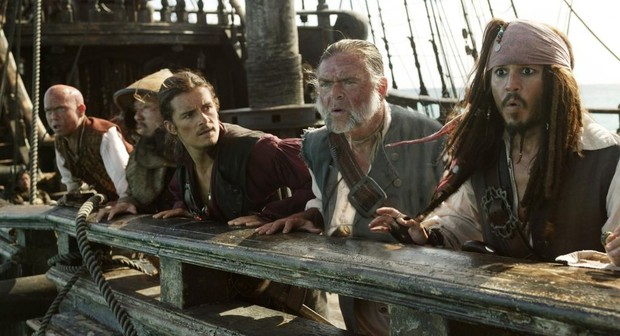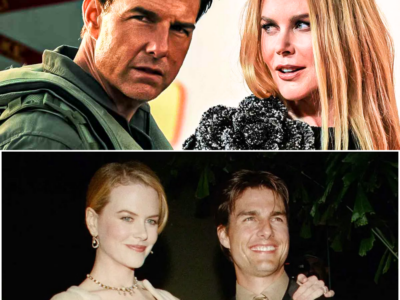The Pirates of the Caribbean film series, with Johnny Depp’s iconic portrayal of Captain Jack Sparrow, has captivated audiences worldwide since its debut in 2003. Rooted in the Disney theme park attraction, the franchise blends adventure, fantasy, and humor, set against the backdrop of the Golden Age of Piracy. With five films released between 2003 and 2017, the series has grossed over $4.5 billion globally, making it one of Hollywood’s most successful franchises. As fans eagerly await the sixth installment in 2026, this article delves into the details of each film, highlighting their plots, characters, and impact, while offering a glimpse into what lies ahead.
Pirates of the Caribbean: The Curse of the Black Pearl (2003)
The journey began with The Curse of the Black Pearl, directed by Gore Verbinski and produced by Jerry Bruckheimer. Initially met with skepticism due to the declining popularity of pirate films and its theme-park origins, the movie defied expectations, grossing $654.3 million worldwide. Johnny Depp’s eccentric Captain Jack Sparrow, inspired by Keith Richards and Looney Tunes characters, became the heart of the film, earning him an Oscar nomination.
The plot follows Jack Sparrow, a cunning pirate seeking to reclaim his ship, the Black Pearl, stolen by his mutinous first mate, Captain Hector Barbossa (Geoffrey Rush). Barbossa and his crew are cursed, transformed into undead skeletons under moonlight after stealing Aztec gold. Meanwhile, Will Turner (Orlando Bloom), a blacksmith, teams up with Jack to rescue Elizabeth Swann (Keira Knightley), who is kidnapped by Barbossa’s crew. The film’s mix of swashbuckling action, supernatural elements, and witty dialogue set the tone for the series, establishing Jack as a lovable rogue who navigates chaos with charm and improvisation.

The film’s success lay in its ability to revive the pirate genre, blending practical effects with CGI to create memorable scenes like the skeletal pirates in moonlight. Its critical acclaim (79% on Rotten Tomatoes) and five Oscar nominations cemented its status as a modern classic.
Pirates of the Caribbean: Dead Man’s Chest (2006)
Following the first film’s success, Disney greenlit two sequels to be filmed back-to-back. Dead Man’s Chest, also directed by Verbinski, raised the stakes with a darker tone and more ambitious visuals. Released in 2006, it became the year’s highest-grossing film, earning $1.1 billion worldwide.
The story picks up with Jack Sparrow indebted to Davy Jones (Bill Nighy), the monstrous captain of the Flying Dutchman. Jones demands Jack’s soul unless he delivers 100 souls or finds Jones’ heart, locked in the titular Dead Man’s Chest. Will and Elizabeth, now engaged, are arrested for aiding Jack’s escape in the first film. They become entangled in Jack’s quest, facing betrayals, sea monsters like the Kraken, and the scheming Lord Cutler Beckett (Tom Hollander) of the East India Trading Company. The film ends on a cliffhanger, with Jack swallowed by the Kraken and Barbossa mysteriously resurrected.

Dead Man’s Chest expanded the franchise’s mythology, introducing Davy Jones as a tragic yet terrifying villain. The film’s groundbreaking CGI, particularly for Jones’ tentacled face, earned an Oscar for Best Visual Effects. Despite mixed reviews (53% on Rotten Tomatoes) for its complex plot, fans embraced the action-packed sequences and Johnny Depp’s comedic performance.
Pirates of the Caribbean: At World’s End (2007)
The trilogy concluded with At World’s End, released in 2007 and directed by Verbinski. With a $300 million budget, it was one of the most expensive films ever made at the time, grossing $960 million worldwide. The sprawling narrative tied up loose ends while introducing new characters like Sao Feng (Chow Yun-fat) and Calypso/Tia Dalma (Naomie Harris).
The plot centers on rescuing Jack from Davy Jones’ Locker, a surreal afterlife. Will, Elizabeth, Barbossa, and their allies form an uneasy alliance with the Brethren Court, a council of pirate lords, to combat Beckett’s armada and Jones’ forces. Themes of betrayal, sacrifice, and freedom dominate, culminating in a massive maelstrom battle. Will becomes the new captain of the Flying Dutchman, bound to ferry souls for eternity, while Jack sails off for new adventures.

At World’s End is the most divisive of the trilogy, with a 44% Rotten Tomatoes score due to its convoluted story and 169-minute runtime. However, its epic scope, stunning visuals, and emotional depth resonated with fans. Johnny Depp’s performance remained a highlight, balancing humor with moments of vulnerability.
Pirates of the Caribbean: On Stranger Tides (2011)
After Verbinski’s departure, Rob Marshall took the helm for On Stranger Tides, released in 2011. With a $378.5 million budget, it was the costliest film ever made at the time, grossing $1.04 billion. Orlando Bloom and Keira Knightley did not return, shifting focus to Jack Sparrow as the central protagonist.
The story follows Jack’s quest for the Fountain of Youth, pursued by the ruthless Blackbeard (Ian McShane) and his daughter Angelica (Penélope Cruz), Jack’s former lover. Barbossa, now a privateer for the British Navy, and the Spanish fleet also seek the Fountain. The film introduces mermaids and voodoo elements, with a lighter, standalone tone compared to the trilogy’s complexity.

On Stranger Tides received mixed reviews (33% on Rotten Tomatoes) for its formulaic plot and lack of Will and Elizabeth’s emotional weight. However, Depp’s charisma and the chemistry between Jack and Angelica kept audiences engaged. The film’s exotic locations, like Hawaii and Puerto Rico, added visual splendor.
Pirates of the Caribbean: Dead Men Tell No Tales (2017)
The fifth film, directed by Joachim Rønning and Espen Sandberg, aimed to recapture the original’s spirit. Released in 2017, Dead Men Tell No Tales grossed $794.8 million but was the least financially successful of the series. Johnny Depp returned as Jack, joined by new characters Henry Turner (Brenton Thwaites), Will and Elizabeth’s son, and Carina Smyth (Kaya Scodelario), an astronomer.
The plot revolves around Jack’s hunt for the Trident of Poseidon, which grants control over the seas. He’s pursued by Captain Salazar (Javier Bardem), a ghostly Spanish pirate hunter with a personal vendetta against Jack. Henry and Carina join forces to break Will’s curse, leading to a climactic battle. Orlando Bloom and Keira Knightley make brief appearances, tying the story to the original trilogy.

Dead Men Tell No Tales received a 31% Rotten Tomatoes score, criticized for its predictable narrative and overreliance on CGI. Still, Depp’s performance and the return of familiar characters delighted fans. The post-credits scene, hinting at Davy Jones’ return, sparked speculation about future installments.
The Road to Part 6 (2026)
As the sixth film approaches, uncertainty surrounds Johnny Depp’s involvement due to his legal battles with Amber Heard and Disney’s initial decision to exclude him. However, recent reports suggest Disney is developing two scripts, one potentially featuring Depp, alongside a female-led spin-off starring Margot Robbie. Producer Jerry Bruckheimer has confirmed progress on a reboot, with a possible summer 2025 release if production begins early. Kaya Scodelario is contracted to return, and Orlando Bloom has expressed interest, while Keira Knightley seems content with Elizabeth’s arc.

The sixth film may explore Davy Jones’ return, as teased in Dead Men Tell No Tales, or introduce new characters like Anne Bonny, inspired by historical pirates. Fans hope for a balance of nostalgia and fresh storytelling, possibly revisiting Jack Sparrow’s early adventures or concluding his saga.
Legacy and Impact
The Pirates of the Caribbean series redefined the pirate genre, blending humor, heart, and spectacle. Johnny Depp’s Jack Sparrow remains its cornerstone, transforming a supporting role into a cultural icon. The films’ success lies in their ability to evolve—from the trilogy’s mythic arcs to the standalone adventures of later entries—while retaining the charm of high-seas escapism.
Each film offers something unique: The Curse of the Black Pearl for its groundbreaking freshness, Dead Man’s Chest for its daring ambition, At World’s End for its epic scale, On Stranger Tides for its romantic intrigue, and Dead Men Tell No Tales for its nostalgic callbacks. The series’ blend of practical effects, CGI, and memorable characters ensures its enduring appeal.
Conclusion
As we await Pirates of the Caribbean 6 in 2026, the franchise’s legacy as a swashbuckling masterpiece endures. Whether you’re drawn to Jack Sparrow’s witty one-liners, the romance of Will and Elizabeth, or the thrill of naval battles, there’s something for every fan. Which film in the series is your favorite, and what do you hope to see in the next chapter of this high-seas adventure?
